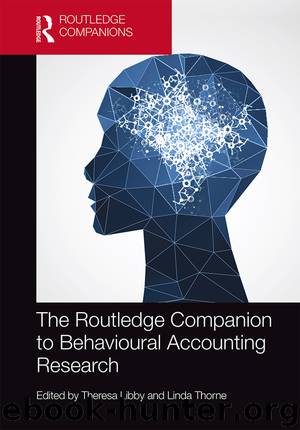The Routledge Companion to Behavioural Accounting Research by Libby Theresa Thorne Linda

Author:Libby, Theresa,Thorne, Linda
Language: eng
Format: epub
Publisher: Taylor & Francis Ltd
Published: 2017-10-12T16:00:00+00:00
Generalizing from case studies
Dealing with the issue of generalization in social sciences requires the recognition of an important premise: the difficulty of predicting human behaviour. Thus, social researchers face a crucial dilemma when trying to extend their conclusions beyond the specific context they are analyzing. On the one hand, they would like to make valid generalizations of individuals’ behaviours with the purpose of providing insights on how to engage in convenient social interaction with others. On the other hand, they cannot neglect the independence and freedom individuals have to choose their courses of action, i.e., they cannot overlook their unpredictability. So any consideration of generalization in case studies should start from the idea that generalizations in social sciences may exist, but in a significantly weaker form than hard sciences. This consideration is even stronger for case study researchers that adopt an interpretive or a critical perspective. In fact, given that these researchers presume that the meaning of human behaviours is socially constructed, they propose the absence of trans-temporal and trans-spatial regularities in any unconditional sense. Despite this fact, one may assume the existence of at least some social structures containing some certain, though, transient regularities (Humphrey and Scapens 1992; Lukka and Kasanen 1995).
So what kind of generalization is possible from case studies? First of all, it is possible to say that it is not a generalization based on statistical inference. Rather it is a form of ‘theoretical’ or ‘analytic’ generalization. These two labels imply gaining generalizability from interpreting case findings through, or against, existing theories or a systematic induction deriving from comparative case analysis (Chua 1989; Eisenhardt 1989; Eisenhardt 1991; Lukka and Kasanen 1995).
There are different ways of realizing ‘theoretical’ or ‘analytic’ generalizations. The common element of these different ways is the attempt to explain individual observations with their specific wholeness and integrity, by using a holistic approach (Ryan et al. 2002). One mode is using case studies to apply a certain theory in new contexts so that the theory is likely to be refined and/or modified and through this process the theory is generalized (Ryan et al. 2002). This is what happens for example when the study of new cases leads to additional new important determinants of a specific phenomenon. The contribution by Cristofoli, Liguori, Sicilia and Steccolini (2010) achieved this objective when, by analyzing the field, they showed that the management controls adopted in public-private inter-organizational relationships depended not only on the organizational variables characterizing transactions but also on the political visibility of the public service provided by the outsourcers. Another way of realizing generalization is to use case studies to identify the real (causal, teleological or other) tendencies and determinants that explain a certain phenomenon (Whitley 1984; Lukka and Kasanen 1995). For example, Caglio and Ditillo (2012b) illustrate the role of individuals in explaining open book accounting. The deep analysis of the case, supported by theory, allowed to analytically generalize, and extend beyond the single case analyzed, the role and importance of individuals in sharing accounting information between partner organizations.
Download
This site does not store any files on its server. We only index and link to content provided by other sites. Please contact the content providers to delete copyright contents if any and email us, we'll remove relevant links or contents immediately.
Zero to IPO: Over $1 Trillion of Actionable Advice from the World's Most Successful Entrepreneurs by Frederic Kerrest(4499)
Machine Learning at Scale with H2O by Gregory Keys | David Whiting(4290)
Never by Ken Follett(3931)
Harry Potter and the Goblet Of Fire by J.K. Rowling(3843)
Ogilvy on Advertising by David Ogilvy(3598)
Shadow of Night by Deborah Harkness(3356)
The Man Who Died Twice by Richard Osman(3067)
Book of Life by Deborah Harkness(2928)
The Tipping Point by Malcolm Gladwell(2909)
Will by Will Smith(2904)
0041152001443424520 .pdf by Unknown(2843)
My Brilliant Friend by Elena Ferrante(2823)
Purple Hibiscus by Chimamanda Ngozi Adichie(2811)
How Proust Can Change Your Life by Alain De Botton(2801)
How to Pay Zero Taxes, 2018 by Jeff A. Schnepper(2643)
Hooked: A Dark, Contemporary Romance (Never After Series) by Emily McIntire(2544)
Rationality by Steven Pinker(2349)
Can't Hurt Me: Master Your Mind and Defy the Odds - Clean Edition by David Goggins(2319)
Borders by unknow(2301)
